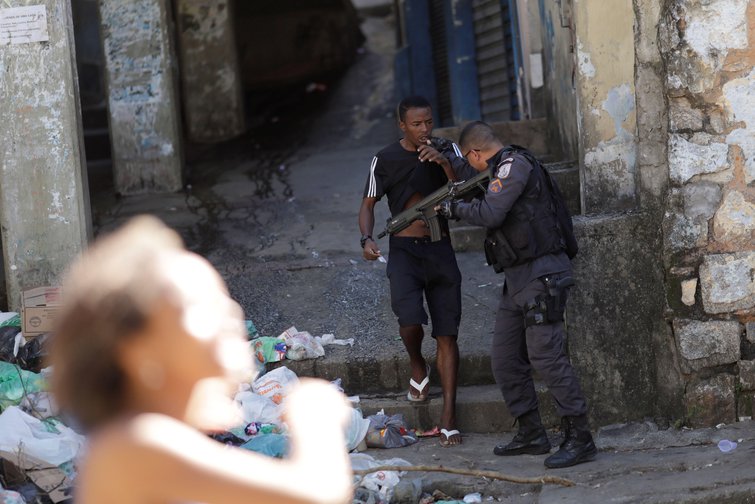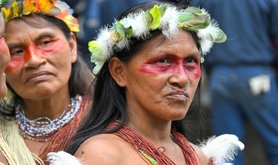
Brazil’s policing is a war of men. Civilians are caught in the crossfire
Rio de Janeiro’s security policy, led by a masculine logic of war, subjects people to authoritarian actions with no regard for human rights


On 8 June last year, interior designer Kathlen Romeu, then four months pregnant, was walking with her grandmother on the streets of Complexo de Lins, in the north of Rio de Janeiro, when she was hit in the chest by a rifle shot. Taken in a police car to the hospital, the 24-year-old, along with her unborn child, later died from her injuries. Residents of the favela claim she was shot during a police manoeuvre known as a ‘Trojan horse’, an illegal ambush in which police invade a residence to use it as a point of surprise attack.
Romeu’s is not an isolated case. Police violence in Brazil is notorious, alarming and historic – and by no means accidental. Police repression of drug trafficking in the country has been bloody since the 1980s. Paradoxically, the period of redemocratisation following the end of the military dictatorship in 1985 coincided with a flagrant militarisation of the state's public security policy. This militarised policy’s main target since then has been a supposedly wild and dangerous male figure: the drug trafficker.
By understanding the war on drugs as a confrontation between two warrior masculinities – police and drug traffickers – the actions of the state are governed by a masculine militaristic logic. In this view of public security, the police are the soldiers, charged with the elimination of the enemy and the conquest of territory. Non-military measures of governance are discarded, while the population is required to tolerate authoritarian actions with total disregard for human rights.
In this war of men against men, the losers are the residents of the favelas, often women, who are caught in the crossfire between drug trafficking and the state security forces.
We’ve got a newsletter for everyone
Whatever you’re interested in, there’s a free openDemocracy newsletter for you.
The ‘enemy of the state’
The arrival of cocaine in Rio de Janeiro in the 1970s and 1980s not only revolutionized the illegal drug market, but also provoked profound changes in the city. Due to the high profits on offer, the first drug-trafficking factions emerged, engaging in successive territorial disputes for storage space and access to new markets. These disputes between rival groups, together with the increasing circulation of firearms, produced a strong increase in the city's violence, where the favelas came to be seen as ‘crime hubs’.
Police violence in Brazil is notorious, alarming and historic – and by no means accidental
Central to this characterization is the drug trafficker – recurrently referred to only as a bandido – whose image is associated with that of a young, poor, Black man, seen as dangerous and heavily armed, who holds power over a territory and its residents. The drug trafficker defies the monopoly of violence and the laws of the state.
By sharing the territories occupied by drug traffickers – and supposedly subjecting themselves to the laws, guardianship and protection of the self-proclaimed ‘lords of the favelas’ – residents of the shantytowns have been inadvertently criminalised. They are associated with the supposedly savage and dangerous masculinity of drug trafficking, which produces the separation between state territory and enemy territory.
Public security as war, police officers as soldiers
Since the late 1990s, the idea of public security being associated with military masculinity has dominated among governors, mayors, and police chiefs in the state of Rio de Janeiro.
Nilton Cerqueira, who was the secretary of public security from 1995 to 1998, stated in 1996 that “a bandido is not a civilian.” Two years later, his successor, Noaldo Alves da Silva, went even further, proclaiming that “a bandido who shoots at the police does not deserve to survive, he has to be eliminated from social life”.
Security forces have adopted the warrior ethos in their police work. After the end of Brazil’s military dictatorship in the 1980s, the state police forces were not demilitarised, and the bandido came to replace the ‘subversive guerrilla’ as the male enemy figure. In the police forces, the understanding of police officers as combatant soldiers prevailed. Even with the entry of women into the forces during the redemocratisation period, the “basic institutional masculinity” was maintained.
Public policies, such as the so-called ‘Wild West bonus’ – a bonus of 50-150% of the salary for police officers who demonstrated ‘fearless courage’ in operations – have also geared police towards confrontation and elimination of the adversary. The results of this policy, which was in place from 1995 to 1998, were fatal: after its introduction, the number of people killed in police operations increased significantly.
Yet even after the abolishment of the Wild West bonus, the masculine logic of war became more pronounced. In the early 2000s, there was already a sharp increase in the number of deaths caused by police officers, reaching more than 1,300 fatal victims in 2007.
The failure of the Pacifying Police Units
After decades of a bloody war on drugs, the Pacifying Police Units (UPP) program was implemented in 2008 to establish a public security policy focused on respect for human rights, in line with the agenda of the left-wing Workers' Party that was, at the time, in the federal government. Some 38 pacification units were initially installed in the Rio de Janeiro capital and its outskirts.
The concept of the UPPs followed, to a large extent, an idea of humanising police work as a way of gaining the trust of the population. The intention was to break with the logic of war and place greater emphasis on citizen security, introducing ‘community policing’ as a new model for public safety. This strategy, which at first proved to be effective, reducing shootouts and weapon circulation in the ‘pacified’ favelas, soon began to show signs that it was not working as expected. Communal activities, such as funk parties, were banned and residents reported abusive policing practices, such as irregular body searches and sexual harassment.
The UPPs program began winding down in 2013 and was subordinated to the battalions of the Military Police four years later – effectively marking its termination. Experts point out that the flaws in the program were basically due to a conflict of paradigms: on the one hand, community policing and human rights orientation, on the other, the persistence of the warrior ethos and the ‘wild masculinity’ in the police identity.
In specialist or tactical police forces, in particular, such as the Special Police Operations Battalion (BOPE), the logic of war and confrontation prevailed in the territorial recovery of areas controlled by organised crime, a prerequisite for the introduction of UPPs. These tactical groups are known for their particularly brutal actions and have been denounced both domestically and internationally. As early as 2005, a UN report showed evidence of torture and summary execution of adolescents carried out by BOPE soldiers. In 2013, already during the UPP period, BOPE was responsible for a massacre in the Maré favela, leaving 10 fatal victims.
In the war of men against men, it is women who bear the invisible wounds
The case of Amarildo de Souza, a resident of Rio’s Rocinha favela, who disappeared after being interrogated by UPP officers in 2013, was emblematic of the program's downfall. Three years later, 11 UPP officers and a commander were convicted of torturing and killing de Souza, as well as concealing his body and procedural fraud.
The war of men against men
With the failure of the UPP program, the masculine logic of war in Brazilian public security has returned with force – gaining power and prominence in the government of Jair Bolsonaro, a former army captain elected as Brazil’s president in 2018. Built on an alliance of conservative forces, the Bolsonaro administration has appointed military personnel from the armed forces, particularly the army, to decisive positions in the different levels of public administration.
In the state of Rio de Janeiro, the administrations of hardliner governors Wilson Witzel, elected during the Bolsonarist wave of 2018, and his successor, Cláudio Castro, also an ally of the president, were responsible for the truculent public security policy that still exists in the state.
Record rates of police violence reaffirm the masculine logic of war in security. The deaths of at least 29 persons in a police operation in the Jacarezinho massacre in May 2021 is one of many examples of the brutality committed against the poor and peripheral populations of the state’s capital. It was the largest police massacre in the history of the city of Rio de Janeiro.
In parallel, paramilitary and parapolice groups – the so-called ‘militias’ – gain power. Today, the militia already controls more than half of the city of Rio de Janeiro. The bloodiest evidence of the growing power of militia groups is the murder of city councillor Marielle Franco in 2018 – a crime that remains unsolved until the day.
Those who lose are the residents of the favelas. In the confrontation between security forces and crime, women are frequent victims and are often subjected to specific forms of police violence. Cases of harassment, extortion, rape and torture practised by police against women have been reported, but rarely analysed and debated.
In the war of men against men, it is women who bear the invisible wounds of a failed public policy that still relies on confrontation and the elimination of the enemy.
This article is partially based on the results of a study titled ‘Police Soldiers, Elite Squads, and Militia: Militarized Masculinities and Public Security Discourses in Rio de Janeiro (1995-2018)’, by Kristina Hinz and Juliana Vinuto, published in the International Feminist Journal of Politics, available here.
Read more
Get our weekly email




Comments
We encourage anyone to comment, please consult the oD commenting guidelines if you have any questions.